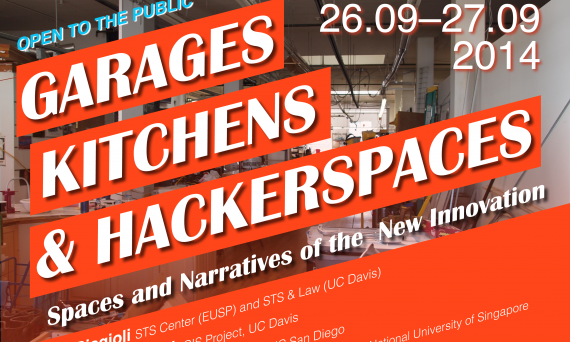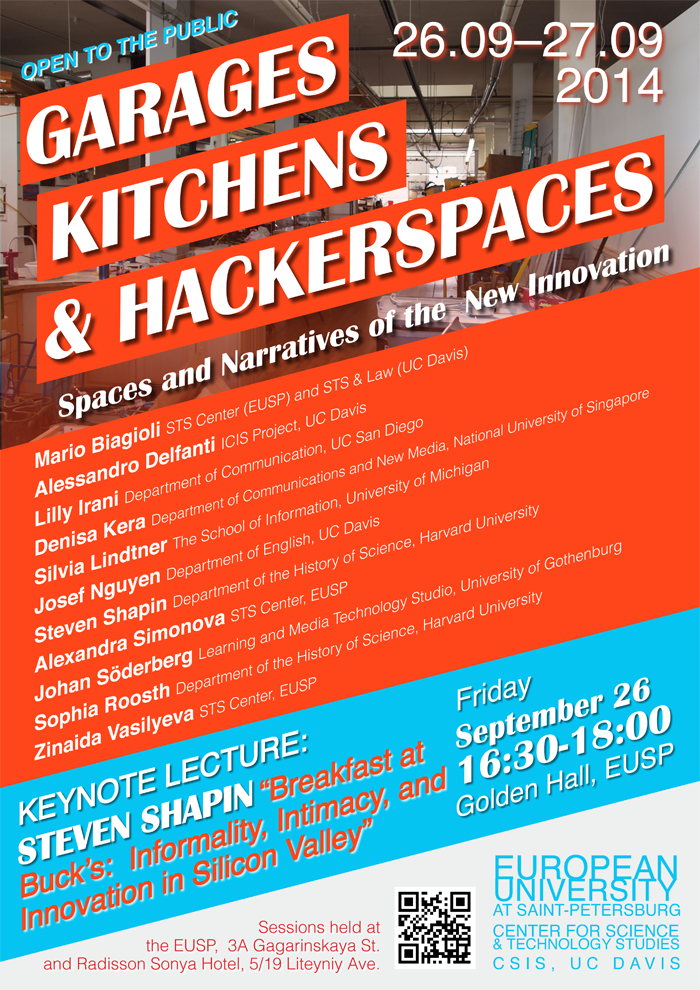International conference "Garages, Kitchens, and Hackerspaces: Spaces and Narratives of the New Innovation" -- EUSP, September 26-27, 2014.
Informal and often communal spaces of innovation like garages, kitchens and hackerspaces have recently eclipsed both the university and corporate laboratory in the eyes of a growing number of scholars and commentators, possibly pointing to important changes in the very notion of innovation and its practices. They have also provided a corrective to a tendency to see innovation as migrating completely into cyberinfrastructure, leaving everything but keyboards behind.
This new focus on garages, kitchens, and hackerspaces has also been accompanied by new narratives about the production of technology and the changing notion of entrepreneurship. These trends are not completely without precedent -- ham radio builders and operators and other amateurs have always played a role in engineering and the physical sciences. What we see today, however, is the spread of these modes or innovation to a much wider range of fields and disciplines, and to the emergence of new figures of the practitioner that cannot be captured by the role of the traditional bricoleur. What we also see, in some cases, is a shift from an exclusive concern with new modes of production (as in the case of more traditional user innovation that relied on "activated consumers") to new constructions of the producer itself (as in the case of the "recursive publics" instantiated by hackers, DIY biology, and other emergent and often temporary configurations).
In this conference, we bring together scholars who have studied some of the new spaces of innovation as well as the narratives that have been developed about them by both practitioners and commentators. We also want to move back and forth between the worlds of hackers and activists and those of Silicon Valley entrepreneurs, looking at the different roles that new informal spaces of innovation play (or are represented to play) in these different economies and cultures.
The conference is organized by the STS Center at the European University at St Petersburg and sponsored by a Megagrant from the Russian Ministry of Education for a study of Russian Computer Scientists, Hackers, and their Diasporas.
Speakers and commentators in alphabetical order:
- Mario Biagioli (STS & Law (UC Davis) and STS Center (EUSP))
- Alessandro Delfanti (ICIS Project & STS Program, UC Davis)
- Lilly Irani (Department of Communication, UC San Diego)
- Denisa Kera (Department of Communications and New Media, National University of Singapore)
- Vincent Lepinay (Department of Sociology and Medialab, Sciences Po Paris)
- Silvia Lindtner (The School of Information, University of Michigan)
- Josef Nguyen (Department of English, UC Davis)
- Sophia Roosth (Department of the History of Science, Harvard University)
- Olga Sezneva (STS Center, EUSP and University of Amsterdam)
- Steven Shapin (Department of the History of Science, Harvard University)
- Alexandra Simonova (STS Center, EUSP)
- Johan Soderberg (Learning and Media Technology Studio (University of Gothenburg) and IFRIS (Paris))
- Gleb Suvorov (Teplitsa of Social Technologies, Russia)
- Zinaida Vasilyeva (STS Center, EUSP)
Location: EUSP, 3A Gagarinskaya St. and Radisson Sonya Hotel, 5/19 Liteyny Ave. Conference program. Abstracts of the presentations.




















